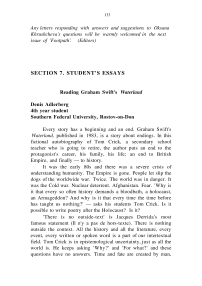Reading Graham Swift's Waterland
Автор: Adlerberg Denis
Журнал: Тропа. Современная британская литература в российских вузах @footpath
Рубрика: Student essays
Статья в выпуске: 9, 2015 года.
Бесплатный доступ
Короткий адрес: https://sciup.org/147231038
IDR: 147231038
Текст статьи Reading Graham Swift's Waterland
Every story has a beginning and an end. Graham Swift's Waterland, published in 1983, is a story about endings. In this fictional autobiography of Tom Crick, a secondary school teacher who is going to retire, the author puts an end to the protagonist's career, his family, his life; an end to British Empire, and finally — to history.
It was the early 80s and there was a severe crisis of understanding humanity. The Empire is gone. People let slip the dogs of the worldwide war. Twice. The world was in danger. It was the Cold war. Nuclear deterrent. Afghanistan. Fear. 'Why is it that every so often history demands a bloodbath, a holocaust, an Armageddon? And why is it that every time the time before has taught us nothing?' — asks his students Tom Crick. Is it possible to write poetry after the Holocaust? Is it?
'There is no outside-text' is Jacques Derrida's most famous statement (Il n'y a pas de hors-texte). There is nothing outside the context. All the history and all the literature, every event, every written or spoken word is a part of our intertextual field. Tom Crick is in epistemological uncertainty, just as all the world is. He keeps asking 'Why?' and 'For what?' and these questions have no answers. Time and fate are created by man, and history is a fairy tale — this is a conclusion Tom comes to. 'The world is about to end, there will be no more reality, only stories'. We have no meta-narratives, we do not need them, we have overgrown our needs for them. Now it is story-time.
Waterland is also a confession, a confession, which had always been private, but in the 20th century came out. Personal history and personal experience are now as important as the history of nations. It is a natural consequence of the death of meta-narratives. In this novel we can see a story of a man and his family in the context of world history. Confession here becomes an escape from the painful reality and the protagonist's painful experience. Telling his story, he finds his own part in history and life.
Besides, all the set of the instruments which we inherited from the 20th century is used in this text. Giving a cursory glance, we could notice many cases of intertextuality: references to Faulkner, Hardy, Marquez and many others. The author also develops a form of constructing time and space of the novel. This is emphasized in the title.
There are a lot of symbols and leitmotifs in the text. Water symbolizes death (the dead body, the lump of the abortion, Dick's fatal jump, etc.), whereas land becomes a symbol of life, work, and rationality. Death and life, creator and destroyer. Graham Swift designs his world, using archetypes and myths.
He also applies to psychoanalysis. Remembering childhoods, there is no escape from talking about trauma. The theme of trauma became very important in philosophical and literary discourse during the 20th century. The concept of trauma is really complicated and in some ways unusual. And it is very important for understanding Graham Swift's novels. Especially Waterland.
The protagonist, who is, furthermore, a narrator, begins his tale with a story of his first years with his father and brother Dick, the years that they spend "far away from the wide world" in a fairy-tale place called Fens. We can descry some acts of incest, violence, murder, love. Through the text we are finding out more and more about Tom Crick and his family, we accompany him in search of the lost time, reliving his life and his own history, finding his own place in the global history, which is going to end.
But the novel is not just about history. It is also about storytelling. Here it becomes very personal for me. Waterland evoked my involuntary memory. I felt like a child again. It makes me remember my loving great-grandmother telling me fairy-tales, sweet tea and a fireplace, my old room in Paris. Warm and infinite sadness. When you read this text, the text of the novel, you start thinking about your life, your place in the world, about the future and the past. What is going on? Will I be able to keep living when everything is going to ruin? What can I do when the death is on the doorstep? What if the water comes? What if it has come?
To sum up, Waterland is a masterpiece about person and personality, storytelling and history, perception and epistemology, private and common, old and new. Every story has a beginning and an end. This book crowns a diversity of great works done during the whole century and at the same time opens new ways and new forms to understand the world, to find yourself. It is a very important part of the literature process.
"The Stowaway" by Julian Barnes. An Alternative Version of the Great Deluge?
Irina Motovilova
Russian-British Institute of Management, Chelyabinsk
How many people nowadays are able to analyze and speculate on what they are reading? Why do people prefer to take things for granted?
The basic idea of the novel A History of the World in ЮУ2 Chapters by J. Barnes is searching for the answers to the questions about mankind's nature, our past, our present and the future of human civilization. Mr. Barnes compares human


